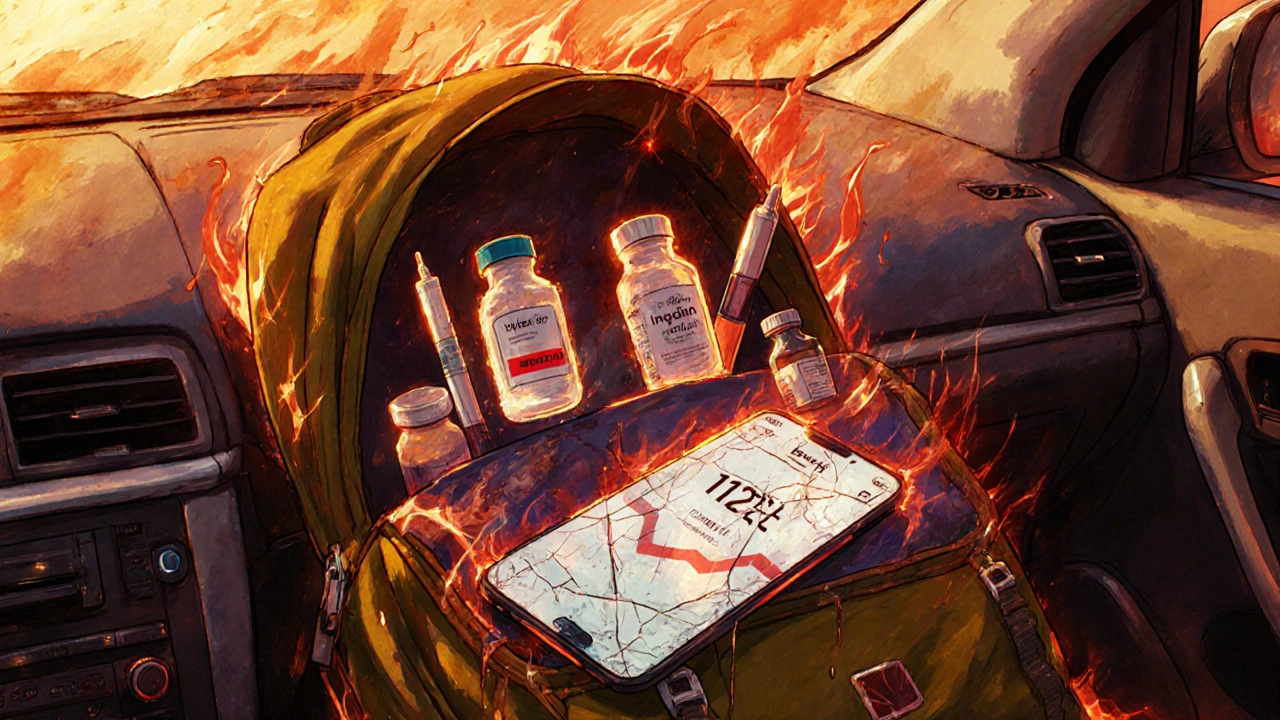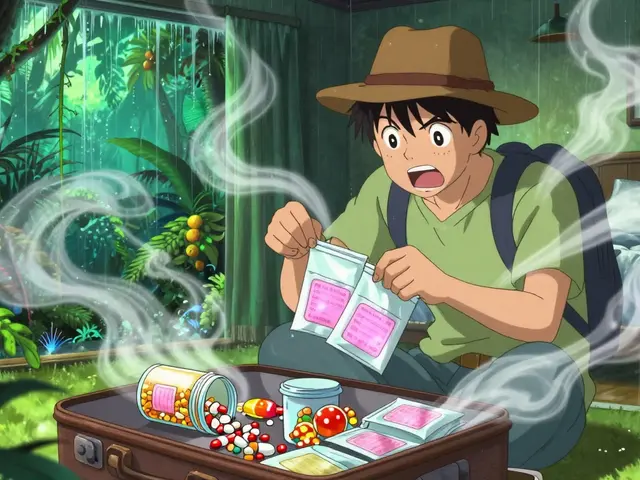When you're traveling in a hot climate, your medications aren't just sitting in your bag-they're in danger. A car dashboard can hit 140°F in under 30 minutes. Your insulin? Your EpiPen? Your birth control? They can lose effectiveness-fast. And if they do, it’s not just inconvenient. It can be life-threatening.
Why Heat Destroys Medications
Most pills and liquids are designed to stay stable between 59°F and 77°F (15°C to 25°C). That’s not your hotel room in Bali at 85°F. That’s not your glove compartment in Dubai at noon. That’s not the trunk of your rental car after a 10-minute errand.Heat doesn’t just make medications warm-it changes their chemistry. Insulin starts breaking down above 86°F. EpiPens can lose potency in under an hour at 100°F. Birth control pills exposed to high temperatures for more than 24 hours have been linked to unintended pregnancies, according to documented cases in clinical reports. Even antibiotics like doxycycline can become less effective or even toxic when overheated.
The U.S. Pharmacopeia says a temperature spike of just 15°F above the recommended range is a critical failure. That means if your medication is supposed to be stored at 70°F and it hits 85°F for more than a few hours, you’re risking your health.
Which Medications Are Most at Risk?
Not all meds are created equal. Some are tough. Others? They’re fragile.- Insulin: Begins degrading above 86°F. Can turn cloudy or clumpy. A failed insulin vial means no blood sugar control.
- EpiPens: Epinephrine loses potency quickly in heat. A compromised EpiPen during an allergic reaction could be fatal.
- Hormonal contraceptives: Studies show up to 32% drop in effectiveness after 24 hours at 104°F.
- Anti-seizure meds: Even small changes in concentration can trigger seizures.
- Inhalers: Albuterol and other asthma inhalers can explode or stop working if left in a hot car.
- Liquid antibiotics and eye drops: Heat accelerates bacterial growth and chemical breakdown.
If you take any of these, you need a plan. Not a guess. Not hope. A real system.
What NOT to Do
Here are the most common mistakes-and why they’re dangerous:- Leaving meds in the car: Even on a 75°F day, your car’s interior can hit 120°F in 20 minutes. Glove compartments and trunks are the worst spots.
- Storing meds in direct sunlight: Sunlight doesn’t just heat-it degrades packaging and active ingredients.
- Putting refrigerated meds in a regular cooler with ice: Ice can freeze insulin or injectables, ruining them. Direct contact with ice packs = damage.
- Checking meds in luggage on a plane: Cargo holds can drop below 20°F or spike over 120°F. Your meds don’t survive that.
- Assuming ‘room temperature’ means your hotel: Most hotels are kept at 80°F or higher. That’s too hot for meds.
These aren’t myths. These are documented failures. One nurse on Reddit shared that a patient got pregnant after leaving birth control in a hot car for two days. Another user’s albuterol inhaler failed during a beach trip-ending in an ER visit.

How to Pack Medications Right
You need a system. Here’s how to build it.- Use an insulated medication bag: Look for ones with phase-change materials that keep temps between 59°F and 77°F for 48-72 hours. The MedActiv Travel Case and Frio Insulated Wallet are proven options.
- For refrigerated meds, use a smart cooler: The MyMediCarrier or TempSure Medication Cooler use ice bricks and Bluetooth sensors to keep insulin or chemo drugs at exactly 42°F. No guessing.
- Never let meds touch ice: Wrap ice packs in a towel first. Direct contact freezes liquids and damages injectables.
- Carry a small thermometer: The American Society of Health-System Pharmacists now recommends this. A $10 digital thermometer lets you check your bag’s temp before use.
- Keep meds with you on flights: Always carry them in your carry-on. Cabin temps stay between 68°F and 75°F-perfect.
- Use a pill organizer only for short trips: If you’re away for more than 2 days, keep meds in original bottles. Labels have storage info and expiration dates.
Pro tip: Before you leave, freeze two ice packs for 24 hours. Wrap them in towels. Place them on either side of your meds in the insulated bag. That’s the ‘cool chain’ method endorsed by the American Pharmacists Association.
Traveling by Air? Here’s the Real Protocol
TSA lets you carry unlimited medications in your carry-on. But you need to do it right.- Keep all meds in original containers with pharmacy labels. No ziplock bags for pills unless it’s a temporary transfer.
- Declare refrigerated meds at security. Some officers aren’t trained to recognize medication coolers-they might think it’s a frozen meal.
- Bring a doctor’s note for injectables or controlled substances. It’s not required, but it saves time and stress.
- Don’t rely on in-flight refrigeration. Airlines don’t provide it for passengers.
Studies show refrigerated meds degrade 47% faster in standard coolers during long flights. Smart coolers with temperature tracking cut that risk by 90%.
What to Do If Your Meds Get Too Hot
If you realize your insulin was left in a hot car for 30 minutes, or your EpiPen was in the sun all day-don’t panic. But don’t use it either.Check the appearance:
- Insulin: Cloudy, clumpy, or discolored? Discard it.
- EpiPen: Discolored or leaking? Replace it immediately.
- Pills: Cracked, sticky, or smelling odd? Don’t take them.
The FDA says if a medication was exposed to extreme heat for more than 24 hours, you should consult your pharmacist before using it. Many pharmacies will replace damaged prescriptions for free-especially if you have the original packaging.
Also, check your travel insurance. Allianz and other major providers now cover medication replacement due to heat damage. You might be eligible for a refund or new supply.

What’s Changing in 2025
The problem is getting worse-and the solutions are getting smarter.- Smart labels: Starting in Q1 2024, new medication packaging will include color-coded heat indicators. Turn red? Don’t use.
- Temperature-controlled airplane compartments: IATA plans to install them in cabins by late 2024.
- AI-powered coolers: Devices like the TempTraq Medication Monitor now sync with your phone to alert you if temps rise above safe levels.
These aren’t gimmicks. They’re necessary. The World Health Organization predicts medication storage failures will rise 15-20% each year due to climate change.
Final Checklist Before You Leave
Before you head out, run through this:- ✅ Are all meds in original bottles with labels?
- ✅ Are refrigerated items in a smart cooler or insulated bag with ice packs wrapped in towels?
- ✅ Do you have a thermometer to check the bag’s temperature?
- ✅ Are you carrying extras? At least one backup of insulin, EpiPen, or critical meds?
- ✅ Are you keeping meds in your carry-on, not checked luggage?
- ✅ Do you know where to get replacements if something fails?
It’s not about being paranoid. It’s about being prepared. Your health doesn’t take a vacation. Neither should your meds.
Can I leave my medication in the hotel room?
Only if the room stays below 77°F. Most hotel AC systems don’t maintain that in hot climates. If you’re unsure, keep meds in your bag with an insulated cooler-even in the hotel. Better safe than sorry.
Do I need to refrigerate all my pills?
No. Most tablets and capsules are fine at room temperature (59°F-77°F). But if your medication is insulin, EpiPen, liquid antibiotics, or hormonal, it needs refrigeration. Always check the label or ask your pharmacist.
What if I forget my cooler?
Use a small insulated lunch bag with a frozen water bottle wrapped in a towel. Place your meds between the bottle and the bag’s side. Avoid direct sun. If you’re out for more than 4 hours, find a fridge at a pharmacy, hotel, or hospital. Most will let you store meds for free.
Can I use a regular cooler for my insulin?
Only if you use ice packs wrapped in towels and monitor the temperature. A regular cooler can get too cold or too warm. A pharmaceutical-grade cooler with a thermometer is far safer. For long trips, it’s worth the investment.
Are there any apps that help track medication temperature?
Yes. Devices like TempTraq and TempSure connect to your phone via Bluetooth and alert you if your meds go outside safe ranges. Sales of these devices jumped 220% in 2023, and they’re now recommended by pharmacists for travelers with critical meds.
What should I do if my medication looks damaged?
Don’t use it. Insulin that’s cloudy or clumpy, EpiPens with discoloration, or pills that are cracked or sticky should be discarded. Contact your pharmacist or doctor immediately. Many pharmacies will replace damaged meds-especially if you have the original packaging and a prescription.
Can travel insurance cover damaged medications?
Yes. Companies like Allianz and World Nomads now cover replacement costs for medications damaged by heat during travel. Check your policy before you go. You’ll need proof of purchase and evidence of exposure (like a photo of your hot car or a receipt from a pharmacy replacement).
What to Do Next
If you’re traveling soon:- Buy an insulated medication bag today-don’t wait.
- Check the labels on all your prescriptions for storage instructions.
- Call your pharmacy and ask if any of your meds are heat-sensitive.
- Carry at least one backup of critical meds (insulin, EpiPen, seizure meds).
- Download a thermometer app for your phone and use a cheap digital probe to test your bag’s temp.
Medications aren’t like sunscreen or a hat. You can’t just buy more if they fail. They’re part of your body’s survival system. Treat them like life support-because in many cases, they are.








OMG I left my insulin in the car for like 20 mins in Florida last summer and I thought I was gonna die 😭😭😭 Thank you for this guide-my pharmacist actually told me to just 'be careful' but this is the first time someone laid it out like life-or-death. I bought a Frio wallet today. No more guessing.
Have you considered that pharmaceutical companies intentionally design medications to be fragile so that people must keep buying them? The heat degradation is not accidental-it is a systemic control mechanism. The WHO report you cite? Likely funded by cooler manufacturers. I’ve survived 3 monsoons in Kerala with my pills in my pocket. No cooler needed. Nature is the real pharmacy.
My EpiPen survived a 110°F hike in Arizona because I wrapped it in a bandana and stuck it in my chest pocket. Body heat is stable. Car heat? Not so much. Also-yes, the thermometer tip is gold. I carry a $7 one. It’s saved me twice. Don’t overcomplicate it. Just keep it on you. Like your phone. Or your dignity.
Anyone who stores meds in a 'regular cooler' without a calibrated thermal sensor is committing medical negligence. The pharmacopeia standards are non-negotiable. You’re not 'being careful'-you’re gambling with your neurochemistry. If you’re not using a TempSure or MyMediCarrier, you’re not serious about your health. Period.
Insulin degrades above 86°F? That’s common knowledge. If you can’t handle basic storage, maybe you shouldn’t be traveling. People die from bad decisions, not bad meds. Your EpiPen isn’t magic-it’s a tool. Use it right or don’t use it at all.
Y’all are acting like this is the first time anyone’s ever had to store meds in heat. I’ve been diabetic since I was 12 and I’ve survived 14 countries and 3 hurricanes. I keep my stuff in a ziplock in my bra. It works. No fancy gadgets. No apps. Just common sense and a little desperation. Also, TSA doesn’t care what you carry as long as it’s not a grenade.
Love the practicality of this. I used to roll my eyes at the 'medication cooler' hype-until my mom’s blood pressure med turned to sludge in a hotel room in Puerto Rico. Now I carry a $12 insulated pouch and a digital thermometer. It’s not about being paranoid. It’s about not being a statistic. Also-thank you for mentioning the pharmacy replacement policy. That’s the hidden safety net most people don’t know exists.
Just wanted to say thank you. I’m a single dad with a kid on seizure meds. This post literally kept me from panicking on our trip to Phoenix. I bought the MedActiv bag, printed the checklist, and taped it to the fridge. My daughter asked why I was so extra. I told her, 'Because I love you more than I love convenience.' She hugged me. Worth it.
While your recommendations are technically adequate, they lack the ontological depth required to address the existential fragility of pharmaceuticals in an era of climatic collapse. The very notion of 'storage' presupposes a stable environment-an illusion perpetuated by Western pharmacology. One must transcend the materialist paradigm: consider the metaphysical resonance of the medication, its vibrational integrity, and the ethical imperative to align one’s travel habits with planetary harmony. A Frio wallet is not a solution-it is a symptom of disconnection.
You missed a critical point: humidity. Heat alone isn’t the enemy-moisture is. Many people use ice packs but forget that condensation inside the bag can ruin pills. Always include a silica gel packet. And never, ever store meds in a plastic bag inside a cooler. Condensation forms on the plastic, not the ice. The moisture migrates. Your pills become damp. Your antibiotics become toxic. This is basic chemistry. If you don’t know this, you shouldn’t be traveling with prescription meds.
Why do you Americans make everything so complicated I just put my pills in my pocket and walk no cooler no app no drama life is simple you overthink everything
^ This. I used to overthink it too. Then I went to Bali for 3 weeks with just my insulin in a ziplock in my shirt pocket. Body temp. No ice. No gadgets. No panic. I’m still here. Sometimes the simplest solution is the most resilient one. Not everything needs a Bluetooth sensor.